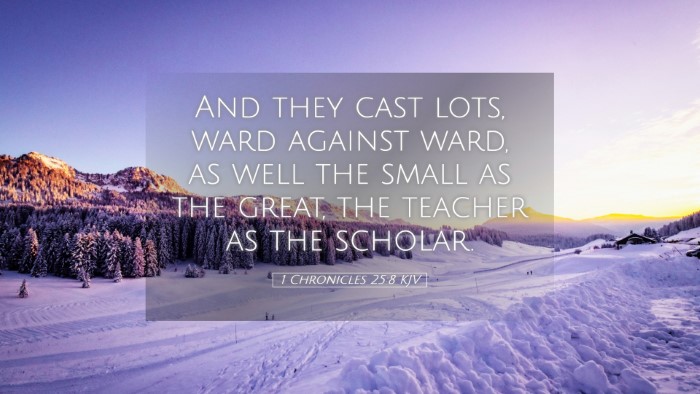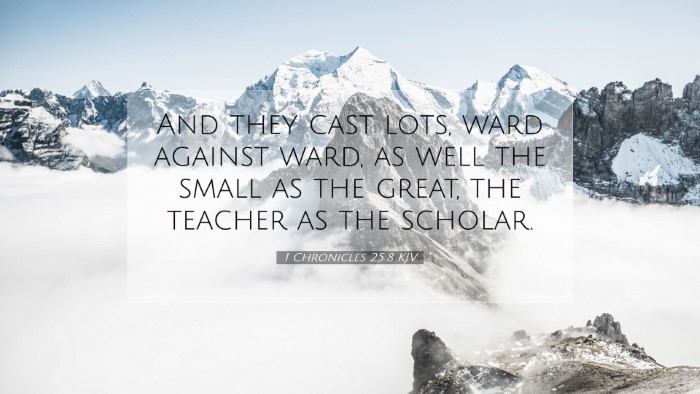Commentary on 1 Chronicles 25:8
Verse Context: 1 Chronicles 25:8 states, "And they cast lots, ward against ward, as well the small as the great, the teacher as the scholar." This verse comes in the context of the organization of the Levitical singers and musicians, emphasizing the importance of structured worship in the temple.
Summary of Insights from Commentaries
This passage highlights the responsibility attributed to the Levites, specifically regarding those appointed to the service of music and praise in the temple. Below, we summarize insights and explanations drawn from Matthew Henry, Albert Barnes, and Adam Clarke, integrating key themes relevant for pastors, students, theologians, and Bible scholars.
Divine Order and Structure
Matthew Henry's Commentary emphasizes the principle of order in worship. He notes that casting lots helped ensure that both the prominent and less significant members of the group received their due roles fairly. This is crucial for maintaining unity and harmony in the community's worship practices.
Albert Barnes adds that this practice demonstrates God’s sovereignty in appointing individuals to specific roles. The casting of lots was a traditional means to discern divine will, ensuring that no human bias influenced the ministry's organization.
Adam Clarke elaborates on the logistics of temple service, explaining that by organizing the musicians and singers into wards (groups or divisions), it prevented chaos during services. This arrangement reflected divine orderliness and respect for God's holiness.
The Importance of Participation
All three commentators delve into the participatory aspect of worship as seen in this verse. The mention of “small and great” signifies that individuals of all ranks are significant in God’s sight and have their roles in the community. The equality in service underscores that the devotion of the heart, rather than social status, is what is prized by God.
- Henry states that every individual, regardless of their public standing, has a key role in worship and must contribute.
- Barnes points out that the division of labor in this case facilitated a more engaging experience for worshippers, allowing the community to engage fully with God.
- Clarke reminds us that each participant in worship carries the weight of the communal faith experience; thus, care must be taken to recognize all contributions.
Teaching and Learning in Worship
The distinction made between "the teacher" and "the scholar" rests on the role of leadership in worship; it calls attention to the need for mentorship and guidance within the community of faith.
- Henry interprets the roles of teacher and scholar not just as titles, but as essential parts of spiritual education within the congregation.
- Barnes affirms the necessity of teaching in worship, highlighting that biblical instruction helps deepen communal understanding of God and Scripture.
- Clarke adds layers to this dynamic by suggesting that knowledge and teaching must be collaborative, where learners and teachers ultimately grow together in faith.
Theological Implications
This verse underscores several theological themes central to Judeo-Christian worship practices. At the heart of it is the respect for God’s chosen order, a reminder that God is a God of peace, not confusion.
- Sovereignty of God: Through the casting of lots, the ultimate authority and divine selection of leaders in worship are illustrated.
- Community and Inclusion: By bringing together individuals of all levels of expertise, this passage demonstrates the inclusivity of God’s call.
- Spiritual Growth: The interplay between teacher and learner signifies a community focused on mutual growth through biblical teaching.
Practical Applications for Ministry
For pastors and leaders today, the principles illustrated in this verse can guide church worship structure and community engagement:
- Encouragement of Participation: Creating opportunities for every believer to contribute to worship—whether in arts, teaching, prayer, or other ministries.
- Structured Worship: Just as the Levites were organized, your church can benefit from clear roles and responsibilities to enhance both worship and fellowship.
- Mentorship and Discipleship: Foster relationships where mature believers guide newer or younger members, reflecting the teacher-student dynamic seen in this verse.
Conclusion
1 Chronicles 25:8 serves as a vital reminder of God's pattern for worship and community engagement. With insights drawn from prominent theologians and commentators, it illustrates the necessity of structure, equality, and spiritual growth within the community of faith. As we reflect on the roles within our worship communities, may we seek to honor God through intentional participation, teaching, and humility.


